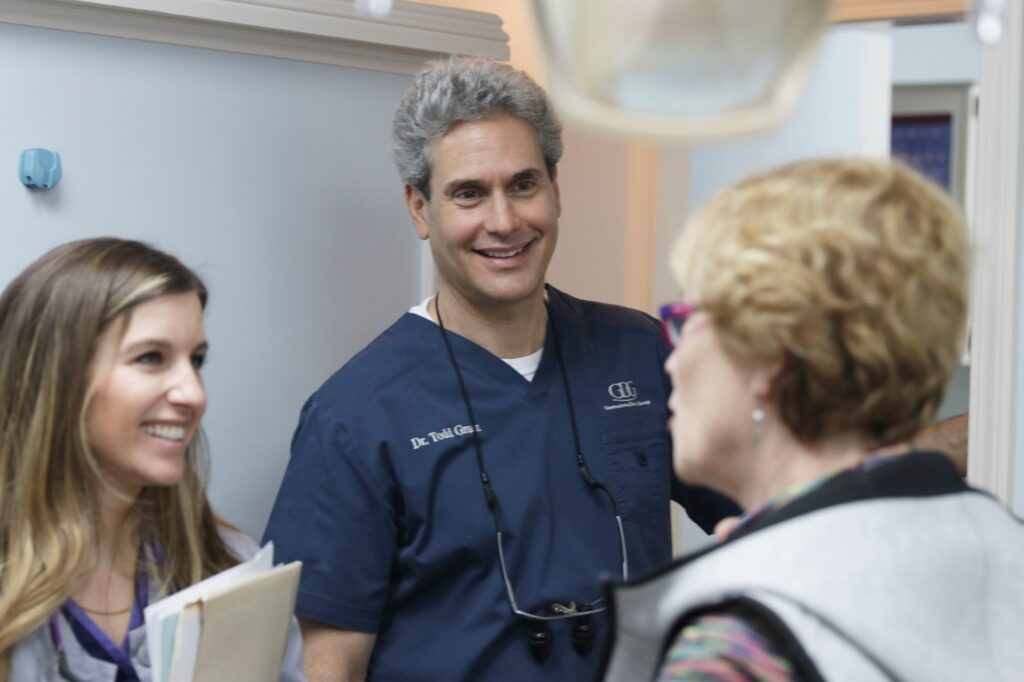Many people don’t think about their saliva until it’s gone, but it plays a crucial role in your oral and digestive health!
Unfortunately, not everyone has the ideal amount of saliva. Though commonly associated with older adults, people of all ages (including children) can suffer from having too little spit! Fortunately, there are ways to relieve the feeling and symptoms of a lack of saliva.
At Germantown Dental Group, your health and comfort are a top priority. We understand the best way to ensure your oral health is to keep you informed; that’s why we want to teach you a little about dry mouth!
What Is Dry Mouth?
Dry mouth (also known as xerostomia) is exactly how it sounds — your mouth is too dry due to a lack of saliva production, and the condition can be temporary or permanent. If your salivary glands do not produce enough saliva, you will likely have thick, stringy saliva and a rough, dry tongue.
Dry mouth does more than make you uncomfortable and long for water; it also harms your oral and physical health.
Without the lubrication of saliva, eating and chewing can be painful and swallowing dangerous. To minimize discomfort, you are likely to chew less and swallow prematurely. Less chewing leads to even less saliva, which means your food is not adequately clumped together before swallowing, increasing your risk of choking. Large foods are also difficult for your body to retrieve nutrients from and can get stuck in your digestive tract. In some cases, dry mouth can discourage eating altogether. Long-term sufferers could develop vitamin deficiency and other complications from poor nutrition.
The condition makes communication challenging, too. Dry cheeks, tongue, and lips can be uncomfortable and potentially crack when moved.
Dry mouth encourages the growth of bacteria and plaque, which increases your chances of getting tooth decay, gum disease, mouth sores, and other infections.
How Can You Prevent Dry Mouth?
If the above sounds like you, don’t worry! There are ways to prevent symptoms from occurring and soothe already developing symptoms.
- Stimulate Saliva Production. You can encourage saliva production by chewing sugar-free gum or sucking on hard, sugar-free candy. It’s crucial that your product of choice be sugar-free to protect your enamel from too much sugar.
- Avoid Alcohol & Caffeine. Alcohol is found in many bottles of mouthwash, and both alcohol and caffeine are found in easily accessible drinks. We advise you to avoid rinsing your mouth with and consuming products containing these ingredients because they can be very dehydrating.
- Stop Nicotine Use. We encourage all our patients to quit using nicotine products to protect their overall physical and oral health. On top of damaging the lungs and teeth, the nicotine found in tobacco and vape products restricts blood flow. Reduced blood flow equals reduced saliva!
- Drink Water. One cause of dry mouth is dehydration. Replace your alcohol and caffeinated products with water to hydrate the mouth. Each sip of water also helps to clear the bacteria and plaque that accumulate whether you have a dry mouth or not, which combats bad breath.
- Store Bought Saliva Substitutes. Sometimes, no matter how hard you try, getting the body to produce enough saliva is impossible or not happening quickly enough. In these cases, we recommend trying saliva substitutes found at the store to prevent and soothe dry mouth symptoms.
- Limit Your Use Of Antihistamines & Decongestants. When your body activates the histamine receptors to combat allergy symptoms, it causes a runny nose and watery eyes to rid the body of the immune system perceived as threatening. In this case, the danger is pollen or pet dander. Antihistamines block histamine receptors to prevent the body’s annoying reaction to these non-threats so you can go about your day with little trouble. Decongestants are medications that help clear a runny or stuffy nose. Difficulty breathing through the nose is often caused by swelling due to allergies or a cold. Decongestants help by shrinking swollen blood vessels and tissues to clear the nasal passageways. In short, antihistamines are drying, and decongestants restrict saliva production. We recommend looking for another way to combat your symptoms, but if you can’t, reduce your use as much as possible and remove any allergens from around you that you can.
Bonus Tip: When choosing store-bought products, check the ingredients list. Many gums, candies, and saliva substitutes contain xylitol, which can cause diarrhea and cramps if overconsumed. You don’t want to solve one problem by creating another!

Visit Germantown Dental Group For More Information!
Dry mouth can be annoying, but for many, it can be avoided! Germantown Dental Group can help you stop it from recurring.
For personalized recommendations based on your lifestyle or health, contact our office to speak to a knowledgeable team member or to book an important!
Whether you need a dental checkup, a cavity filled, dry mouth treatment, or other oral healthcare, Germantown Dental Group has got you covered! Our welcoming staff will have you feeling right at home, and the experienced Dr. Whittemore and Dr. Gruen can help you maintain or restore your oral health!
We hope to see you soon!
 Schedule Now
901-754-0540
Schedule Now
901-754-0540
